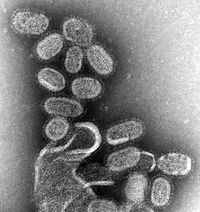
Photo from wikipedia
Feline coronavirus (FCoV), the pathogen for feline infectious peritonitis, is a lethal infectious agent that can cause effusions in the pleural and abdominal cavities in domestic cats. To study the… Click to show full abstract
Feline coronavirus (FCoV), the pathogen for feline infectious peritonitis, is a lethal infectious agent that can cause effusions in the pleural and abdominal cavities in domestic cats. To study the epidemiology of FCoV in Taiwan, 81 FIP-suspected sick cats with effusive specimens were recruited to test for FCoV infection using immunofluorescence staining and reverse transcription-polymerase chain reaction as detection methods, and viral RNAs were recovered from the specimens to conduct genotyping and phylogenetic analysis based on the spike (S) protein gene. The results revealed that a total of 47 (47/81, 58%) of the sick cats were positive for FCoV in the effusion samples, of which 39 were successfully sequenced and comprised of 21 type I strains, 9 type II strains, and 9 co-infections. The signalment analysis of these sick cats revealed that only the sex of cats showed a significant association (odds ratio = 2.74, 95% confidence interval = 1.06–7.07, p = 0.03) with the infection of FCoV, while age and breed showed no association. FCoV-positive cats demonstrated a significantly lower albumin to globulin ratio than negative individuals (p = 0.0004). The partial S gene-based phylogenetic analysis revealed that the type I strains demonstrated genetic diversity forming several clades, while the type II strains were more conserved. This study demonstrates the latest epidemiological status of FCoV infection in the northern part of Taiwan among sick cats and presents comparisons of Taiwan and other countries.
Journal Title: Pathogens
Year Published: 2020
Link to full text (if available)
Share on Social Media: Sign Up to like & get
recommendations!